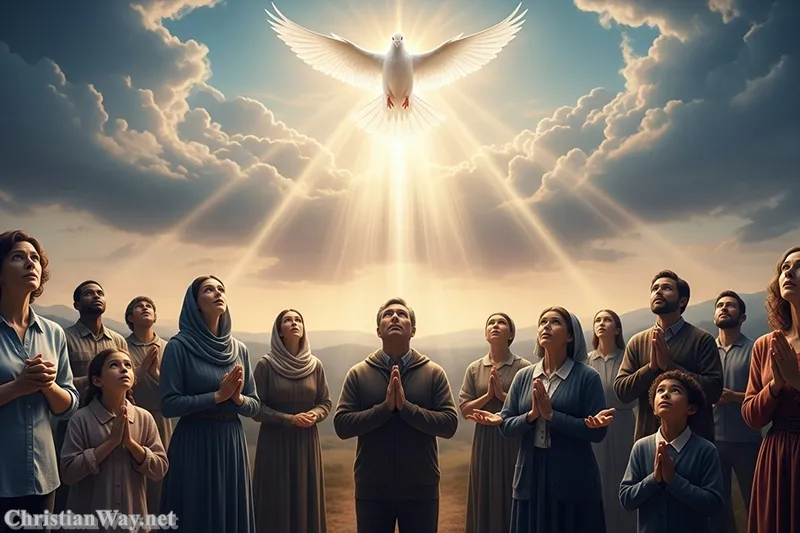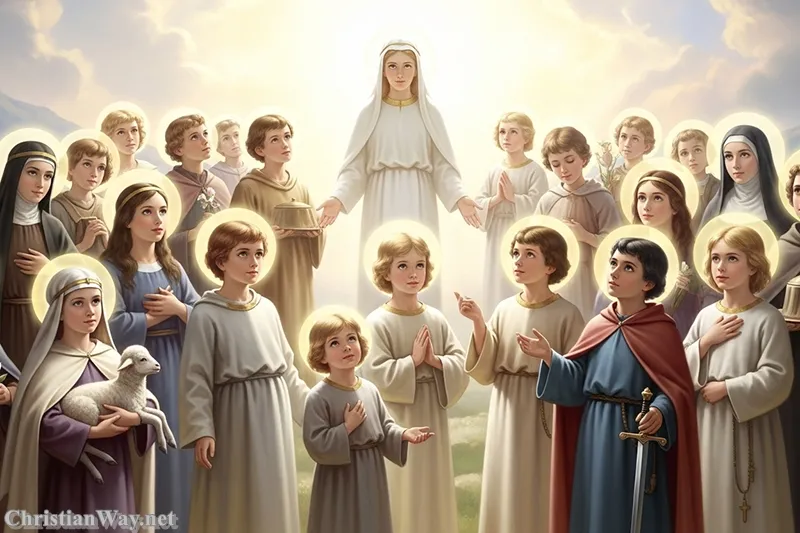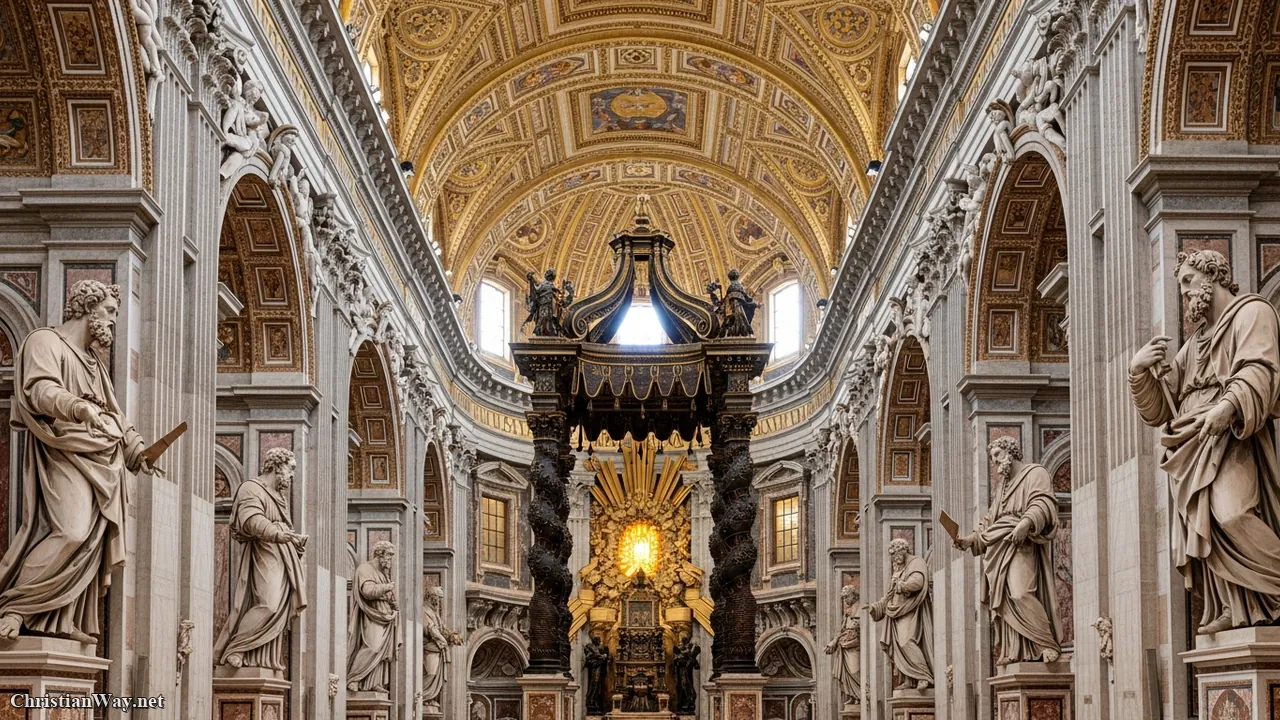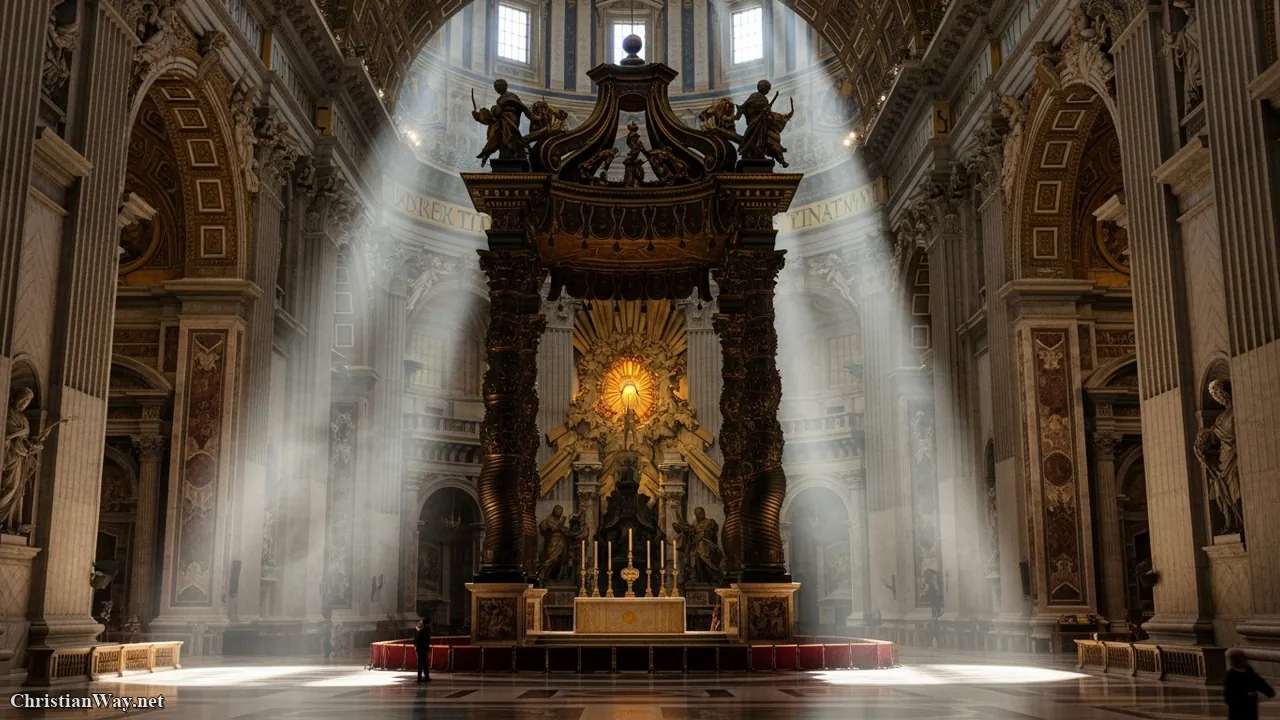Dear friends in Christ,
Every believer who has felt the quiet warmth of peace after prayer, the sudden light of understanding in confusion, or the gentle conviction that leads to repentance, has in truth already met the Holy Spirit. Though unseen, the Spirit is nearer to us than our own breath — the living presence of God within and among His people.
In Catholic theology, the Holy Spirit is not merely a force or symbol of divine action. He is the third Person of the Blessed Trinity, co-equal and co-eternal with the Father and the Son. He is the Love that flows between them, the bond of unity in the Godhead, and the One who brings divine life into the soul. The Church calls Him “the Lord, the Giver of Life”, as we profess in the Nicene Creed.

To speak of the Holy Spirit, then, is to speak of God who lives in us, prays in us, sanctifies us, and forms the Body of Christ — the Church. In this reflection, let us journey through the Catholic understanding of who the Holy Spirit is, how He works in salvation, and how we can open ourselves more deeply to His transforming grace.
The Holy Spirit as the Third Person of the Trinity
The mystery of the Holy Trinity is at the heart of all Christian faith. God is one in essence, yet three in Persons: the Father, the Son, and the Holy Spirit. The Catechism of the Catholic Church explains that the Holy Spirit proceeds eternally from the Father and the Son as from a single principle of divine love (CCC 246).
The Spirit as the Bond of Love
Saint Augustine beautifully described the Holy Spirit as the communion of the Father and the Son, the very Love by which they are one. In human terms, if the Father is the Lover and the Son the Beloved, then the Holy Spirit is the Love that unites them. This love is not abstract, but personal, radiant, and creative.
Through this Love, all things come to life. It was “the Spirit of God [that] was moving over the face of the waters” at creation (Genesis 1:2). The same Spirit hovered over Mary of Nazareth, conceiving the Word made flesh within her. And that same Spirit, poured out at Pentecost, gave birth to the Church.
The Holy Spirit, therefore, is not an afterthought in salvation history. He is active from the beginning — the divine breath (ruach) that gives being, order, and holiness to creation.
The Holy Spirit in the Life and Mission of Jesus
The Gospels show that the Holy Spirit is intimately involved in every moment of Christ’s life and mission. At the Annunciation, the angel told Mary, “The Holy Spirit will come upon you, and the power of the Most High will overshadow you” (Luke 1:35). At Jesus’ baptism, the Spirit descended upon Him “like a dove” (Matthew 3:16), confirming His identity as the beloved Son.
The Spirit as the Power of Christ’s Mission
Throughout His ministry, Jesus acts in the Spirit: He preaches, heals, forgives, and raises the dead “by the finger of God” (Luke 11:20). The Spirit is not separate from Christ’s work but the divine power through which He fulfills the Father’s will.
When Jesus promised His disciples the coming of the Paraclete, He was not leaving them alone; He was promising His very presence in a new and deeper way. “I will ask the Father, and He will give you another Advocate, to be with you forever — the Spirit of truth” (John 14:16–17).
The Spirit of Resurrection
At the Resurrection, the Spirit manifests His supreme power. As Saint Paul writes, “If the Spirit of Him who raised Jesus from the dead dwells in you, He who raised Christ Jesus will give life to your mortal bodies also” (Romans 8:11). Thus, the same Spirit that filled Jesus fills all who belong to Him.
The Pentecost event is the visible sign of this invisible truth: the Spirit descends like wind and fire upon the Apostles, and the Church is born. From that day forward, the Holy Spirit remains the soul of the Church, animating it as the breath animates the body.
The Holy Spirit and the Church
In Catholic theology, the Holy Spirit is not only the giver of individual gifts but the very soul of the Church — “the principle of her unity, the teacher of her truth, and the source of her holiness.”
The Spirit as the Soul of the Church
As the human body lives because the soul gives it life and unity, so too the Church lives because the Spirit indwells her. Saint Augustine wrote: “What the soul is to the human body, the Holy Spirit is to the Body of Christ, which is the Church.” Without the Spirit, the Church would be a mere institution; with Him, she is a living mystery.
The Spirit and the Magisterium
The Catholic Church teaches that the Holy Spirit guides her Magisterium — the Pope and the bishops in union with him — into all truth (John 16:13). This guidance is not about control or power, but fidelity: the Spirit ensures that the Church never loses the truth of Christ entrusted to her.
This same Spirit sustains the Church’s unity across the centuries and across the world, making one people out of every language, nation, and culture.
The Spirit in the Sacraments
Every sacrament of the Church is a work of the Holy Spirit. It is He who transforms the bread and wine into the Body and Blood of Christ during the Eucharist. It is He who forgives sins in the Sacrament of Reconciliation. It is He who consecrates and strengthens the faithful in Confirmation, Matrimony, Holy Orders, and the Anointing of the Sick.
Thus, the Spirit is not a distant presence but the very heartbeat of Catholic worship.
The Holy Spirit and the Christian Soul
While the Spirit sanctifies the Church as a whole, He also dwells personally in each believer. Saint Paul writes, “Do you not know that you are God’s temple and that God’s Spirit dwells in you?” (1 Corinthians 3:16).
The Indwelling Presence
Through Baptism, we are sealed with the Holy Spirit, who makes us children of God and heirs with Christ (Romans 8:15–17). This indwelling presence is not symbolic — it is a real, transforming communion with God Himself.
In the daily life of a Christian, the Spirit acts as both Comforter and Guide — gently forming us in the likeness of Christ. He awakens our conscience, strengthens us in temptation, teaches us to pray, and inspires works of charity.
When we feel drawn to goodness, moved to compassion, or called to repent, it is the Holy Spirit who stirs our heart. The saints often described this presence as a “sweet guest of the soul,” always patient, always near, always leading us toward the Father.
The Gifts and Fruits of the Spirit
Catholic theology recognizes seven gifts of the Holy Spirit — wisdom, understanding, counsel, fortitude, knowledge, piety, and fear of the Lord (Isaiah 11:2–3). These are divine habits that shape the soul into the likeness of Christ and make it responsive to God’s promptings.
The fruits of the Spirit — love, joy, peace, patience, kindness, goodness, faithfulness, gentleness, and self-control (Galatians 5:22–23) — are the visible signs that the Spirit is alive within us. These are not moral achievements, but graces — the natural flowering of a heart filled with God.
The Holy Spirit as Teacher and Sanctifier
The Spirit is often called the “Interior Master” because He teaches us from within. Jesus told His disciples, “The Holy Spirit will teach you all things and remind you of everything I have said to you” (John 14:26).
The Spirit and Scripture
In Catholic tradition, the same Spirit who inspired the authors of Scripture also inspires the Church to interpret it faithfully. Without the Spirit, the Bible becomes a closed book; with Him, it becomes the living Word that pierces the heart and reveals the truth.
Whenever we read Scripture prayerfully — in the light of faith — we encounter not just words, but the living God who speaks to us through them.
The Spirit and Holiness
The Spirit’s ultimate work is to make us holy — to conform us to Christ, so that His divine life may shine through our humanity. This is not accomplished by our strength but by surrender.
As Saint Seraphim of Sarov said, “The true aim of the Christian life is the acquisition of the Holy Spirit.” To be filled with the Spirit is to live no longer for ourselves, but for Christ — to let divine love transform our mind, heart, and actions.
The Holy Spirit and Prayer
Prayer is the natural language of the Spirit within us. Saint Paul tells us, “The Spirit helps us in our weakness; for we do not know how to pray as we ought, but the Spirit Himself intercedes for us with sighs too deep for words” (Romans 8:26).
When we pray, especially in silence, it is often the Spirit who prays within us — guiding our thoughts, purifying our desires, and drawing us toward divine union.
The Spirit and the Church’s Liturgy
Every liturgical act — from the sign of the cross to the Eucharistic celebration — is permeated by the Spirit’s presence. In the Mass, the priest invokes the Holy Spirit in the epiclesis, asking God to send down His Spirit to sanctify the gifts and the faithful.
This moment reveals the Spirit’s hidden but central role: He makes Christ present, He renews creation, He unites heaven and earth in worship.
The Holy Spirit and the Renewal of the World
The Spirit not only sanctifies individuals but renews all creation. As the Psalmist prays, “You send forth your Spirit, and they are created; and you renew the face of the earth” (Psalm 104:30).
Every movement of holiness, every renewal in the Church, every act of justice or mercy in the world, begins with the Holy Spirit. The great saints, reformers, and mystics — from Francis of Assisi to Teresa of Avila, from John Paul II to countless hidden souls — all bear witness that the Spirit is the fountain of renewal and the fire of love that never dies.
Opening Ourselves to the Holy Spirit
How, then, can we open ourselves more deeply to the Spirit’s presence? The answer is both simple and lifelong: by prayer, by silence, by obedience, and by love.
We must pray daily for the grace of the Holy Spirit — not just once, but continually. Jesus promised, “How much more will the Father give the Holy Spirit to those who ask Him!” (Luke 11:13). The Spirit comes where He is invited and abides where He is welcomed.
He speaks in the quiet of the heart, not in the noise of self-will. To listen to Him, we must learn stillness and humility. The Spirit is gentle — He never forces, only invites.
In the Light of Christ
The Holy Spirit is the great mystery of divine nearness — God dwelling within us, transforming us from glory to glory. He is the fire of Pentecost still burning in the Church, the breath of God that animates our prayer, the gentle whisper that leads us to truth.
To live by the Spirit is to live as children of God, confident that even in our weakness, God is at work. Let us therefore pray with the Church through all ages:
Come, Holy Spirit, fill the hearts of Your faithful,
and kindle in them the fire of Your love.
Send forth Your Spirit, and they shall be created,
and You shall renew the face of the earth.
May that same Spirit dwell richly in your heart, teaching you to love, to pray, and to live as one who belongs entirely to God.
— Fr. John Matthew, for Christian Way





